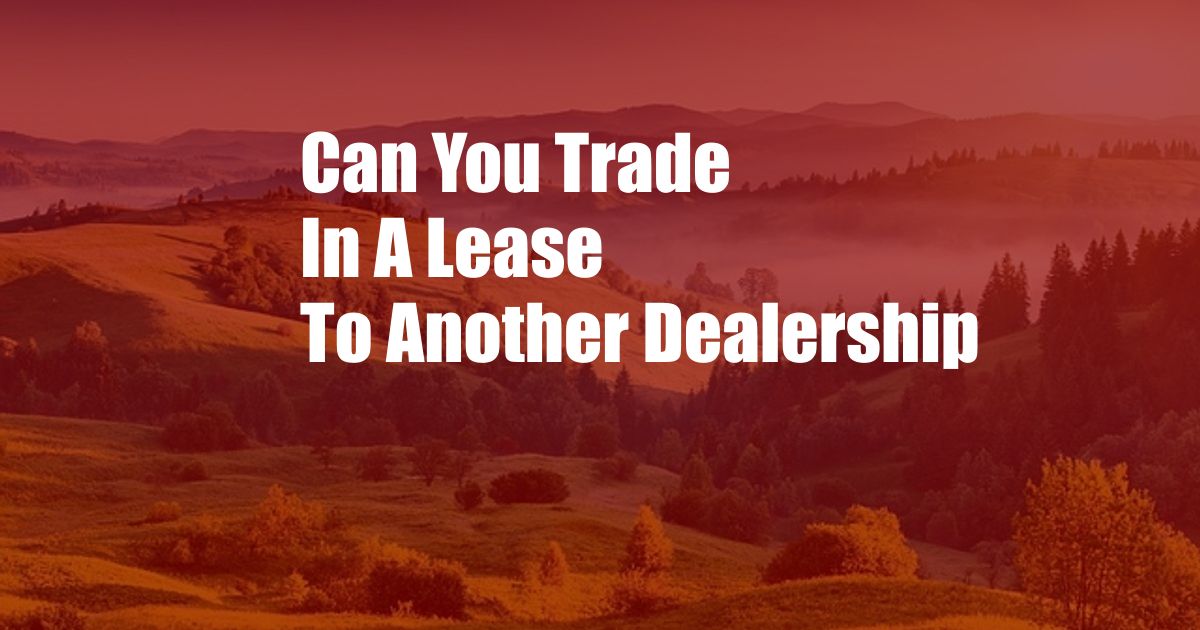
Can You Trade in a Lease to Another Dealership?
In the realm of automotive financing, leasing has emerged as a popular option for those seeking a new vehicle without the long-term commitment of a traditional purchase. However, life circumstances can change, and you may find yourself in a situation where you need to get out of your lease early. Trading in your leased car to another dealership is a potential solution to consider, but it’s crucial to understand the intricacies involved.
Leases typically bind you to a contractual obligation with the original dealership for the entire lease term. Breaking this agreement prematurely can result in hefty penalties such as early termination fees, which can significantly impact your finances. However, all hope is not lost. While the default option is to return the leased car to the original dealership, inquiring about trade-in possibilities at other dealerships can open up additional avenues.
Navigating Trade-in Options
If you’re contemplating trading in your lease at another dealership, it’s imperative to approach the process with caution. Begin by reviewing your lease contract thoroughly. This document will outline the terms and conditions related to early termination, including any associated fees. Understanding these stipulations will empower you with the knowledge necessary to make an informed decision.
Once you’re armed with the details of your lease agreement, it’s time to contact potential dealerships. Be upfront about your situation, explaining that you’re exploring the possibility of trading in your leased vehicle. It’s advisable to provide as much information as possible, including the make, model, mileage, and lease term remaining. Transparent communication will increase the likelihood of dealerships being receptive to your request.
Factors Influencing Trade-in Value
Assuming a dealership agrees to accept your leased car as a trade-in, the next step is to determine its value. Several factors influence the trade-in value, including:
- Car’s condition: Dealerships will meticulously inspect your vehicle, assessing its overall condition, including any cosmetic damage or mechanical issues. A well-maintained car with a clean maintenance history will command a higher trade-in value.
- Mileage: Excessive mileage beyond the agreed-upon lease limits can result in additional charges. Ensure you stay within the mileage allowance to avoid diminishing your trade-in value.
- Market demand: The value of your leased car is also influenced by its popularity in the current market. Cars in high demand tend to retain their value better than those that aren’t as sought after.
- Lease payoffs: The amount you owe on your lease will impact the value of your trade-in. A higher lease payoff means less equity in the vehicle, which can lower the trade-in offer.
Understanding the Costs Involved
While trading in a leased car to another dealership can provide a convenient way to get out of your lease early, it’s essential to be aware of the potential costs involved. In addition to any early termination fees imposed by your original dealership, you may also encounter:
- Mileage overage charges: As mentioned earlier, exceeding the mileage allowance in your lease agreement can result in additional fees. These charges can accumulate and impact your trade-in value.
- Lease payoff fees: If the trade-in value of your leased car falls short of the lease payoff amount, you’ll be responsible for the remaining balance. This can be a substantial sum, especially if you’re early in your lease.
- Sales tax: Depending on your location, you may be subject to sales tax on the difference between the trade-in value and the sale price of the new car you’re purchasing.
Tips for a Successful Trade-in
To maximize the value of your leased car trade-in, consider the following expert advice:
- Negotiate effectively: Don’t accept the initial trade-in offer without comparing it to other dealerships. Be prepared to negotiate and explore all available options to secure the best deal.
- Maintain your car: Regular maintenance, including oil changes, tire rotations, and brake inspections, can significantly enhance your car’s condition and increase its trade-in value.
- Consider the timing: The timing of your trade-in can impact the value. Trading in your car at the end of its lease term or when market demand is high can yield a better return.
FAQs on Trading in a Lease
- Q: Can I trade in my lease to any dealership?
A: Not necessarily. While some dealerships may accept leased vehicles as trade-ins, it’s not a universal practice. It’s always best to contact potential dealerships and inquire about their policies.
- Q: What happens if my trade-in value is less than my lease payoff?
A: If the trade-in value falls short of your lease payoff, you’ll be responsible for the remaining balance. This can be paid in cash, rolled into the financing of a new car, or negotiated with the dealership.
- Q: Are there any benefits to trading in a lease early?
A: Trading in a leased car early can provide the flexibility to upgrade to a newer model, adjust to changing circumstances, or get out of a lease that no longer suits your needs.
Conclusion
Trading in a leased car to another dealership can be a viable option to consider if you need to get out of your lease early. However, it’s essential to approach the process with caution, understanding the potential costs and terms involved. By carefully evaluating your options, negotiating effectively, and seeking expert advice, you can navigate the complexities of trading in a lease and secure a satisfactory outcome.
If trading in your leased car is a matter you’re interested in pursuing, we encourage you to connect with experienced automotive professionals or consult reputable online resources for further guidance.